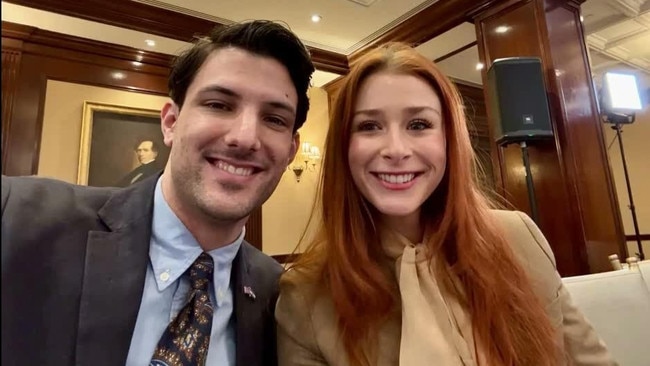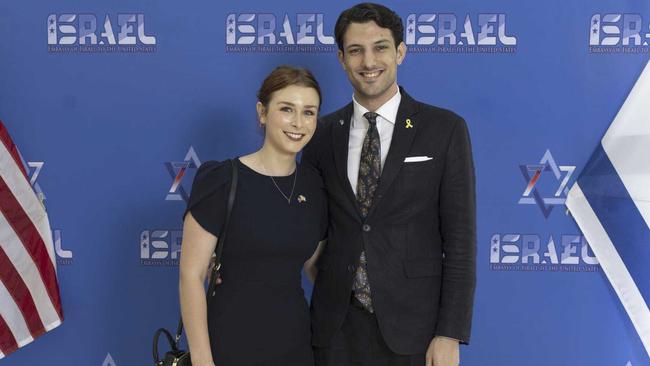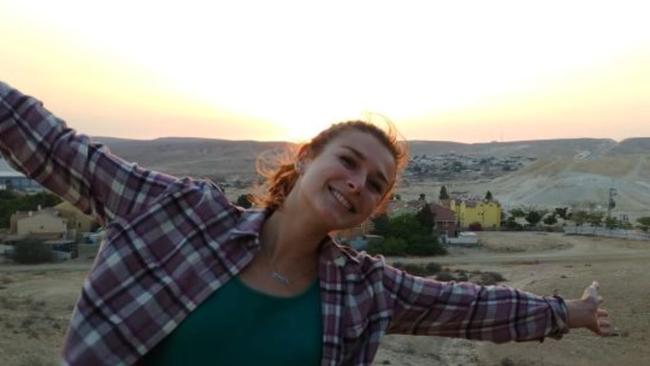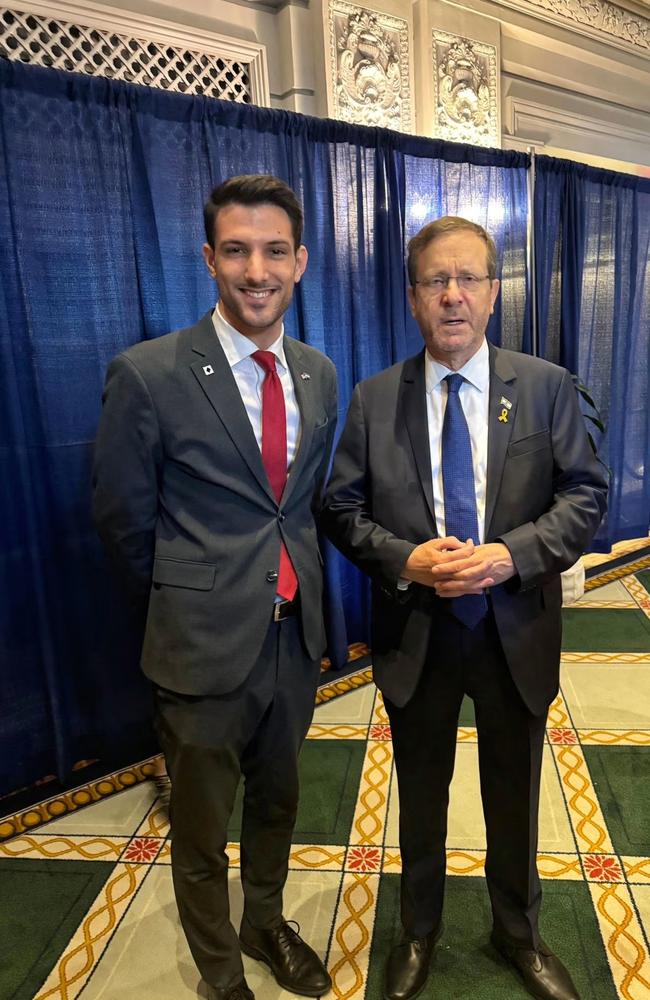Israeli embassy staffers gunned down in D.C. were young, ascendant and in love
Neither Yaron Lischinsky and Sarah Milgrim were high-level diplomats, but rather rising young professionals known to those close to them as devoted to bridge-building, including peace efforts between Israelis and Palestinians.

The day before he was killed, Yaron Lischinsky was on the phone with an airline, anxiously searching for alternatives for a cancelled flight to Israel. Standing outside the auditorium hall of a policy conference in Washington, he confided to a friend that he was taking his girlfriend to meet his parents for the first time in Jerusalem — and that he planned to propose on the trip.
“I think I’m going to do that there,” the 30-year-old Israeli Embassy staffer excitedly told Hussein Aboubakr Mansour, a friend who spoke Thursday to The Wall Street Journal. Lischinsky’s girlfriend, 26-year-old Sarah Milgrim, also worked at the embassy.
The following evening, the couple was leaving an event when they were gunned down outside the Capital Jewish Museum in Washington by a man who had been pacing outside the building. As he was arrested, the suspected shooter, 31-year-old Elias Rodriguez of Chicago, shouted “Free, free Palestine!” Washington’s police chief revealed. Lischinsky and Milgrim were pronounced dead at the scene.
The shocking killing of the two young embassy staffers has reverberated around the world, not only because of the brutality of the attack but because of who they were. Neither were high-level diplomats, but rather rising young professionals known to those close to them as devoted to bridge-building, including peace efforts between Israelis and Palestinians.
“That smile that you see in the photo, that’s actually how he looked all the time,” Mansour said of Lischinsky. “This is really a tragedy, not just for his family and the couple and the D.C. community but for the entire nation.” Bonding at work Lischinsky and Milgrim met at the situation room of the embassy in the fall of 2023. They quickly formed a bond as they supported each other in the aftermath of the Oct. 7 attacks that year, which left 1,200 people dead, said Noa Ginosar, Lischinsky’s boss at the embassy.
The couple was discreet and didn’t make it known they were together for a while, but it was clear to people close to them that it was the real deal.
Once they went public, they spent every moment together, including walking home after work and taking their lunch breaks together. Colleagues often saw Lischinsky, who worked as a research assistant for the embassy’s political team, coming down to Milgrim’s office, a floor below his, to talk and consult with her.

“The awe he expressed at the person that Sarah was [was] just apparent in his eyes when he spoke of her,” Ginosar said. Days before they were killed, Lischinsky had bought the ring he planned to propose with, Israeli Ambassador Yechiel Leiter told reporters on Tuesday.
The Oct. 7 attacks triggered the continuing conflict in Gaza in which more than 53,000 people have been killed, according to Palestinian health authorities. In recent months, Lischinsky worked to secure entry for a Gazan with U.S. citizenship back into the enclave for a visit.
“They killed the peace activists,” says Melanie Robbins, who got to know Lischinsky through her work at the Realign for Palestine program at the Atlantic Council think tank in Washington.
Different backgrounds Lischinsky was born in Jerusalem and moved to Germany when he was young. He returned to Israel around 13 years later in an act that he viewed as Aliyah, the term used by Israelis to refer to immigration to Israel, according to his brother, Hanan.
After serving in the Israeli military, he completed an undergraduate degree in International Relations and Asian Studies and a master’s degree in government. He dreamt of being a diplomat to build bridges between Israel and other countries, especially those in Asia, said Nissim Otmazgin, a dean at the Hebrew University of Jerusalem who taught Lischinsky.
Born to a Jewish father and Christian mother, Lischinsky identified as Christian, according to his friends from university and one of his professors. But he was also connected to Judaism and was raised patriotically Israeli, they said.
When Lischinsky moved to D.C. in 2022 to start his job at the embassy, his colleagues said that he identified as Jewish and celebrated the major Jewish holidays with them. He was known for always being the first one to arrive at work and for constantly volunteering for tasks, including screening through the gruesome online footage from the Hamas-led attack.
Milgrim came from a different background. She and her brother Jacob were raised in Prairie Village, Kan. Growing up, she was involved in the local Jewish community, including a progressive synagogue dedicated to social justice issues.
But even in the relative safety of her affluent Kansas City suburb, antisemitic incidents shook Milgrim’s sense of security, according to people who grew up with her.

In 2014, when she was 15, a white supremacist opened fire outside a Jewish community centre and retirement home in nearby Overland Park, killing three people. Three years later, her high school was vandalised when someone spray-painted swastikas and obscenities on some of the buildings.
“You know, I worry about going to my synagogue and now I have to worry about safety at my school,” she told a local television station at the time. “And that shouldn’t be a thing.” After graduating from the University of Kansas with a degree in environmental studies with a minor in anthropology, she moved to Washington to earn a master’s in international affairs from American University. She also had a certificate in religious engagement and peacebuilding from the United States Institute of Peace.
It was the Oct. 7, 2023, attacks that led her to apply for a job at the Israeli Embassy in Washington, says Ayelet Razin, an Israeli human rights expert who worked with her and became a friend.
Razin was particularly struck by the young staffer’s poise and resilience when she helped to co-ordinate testimony for politicians on Capitol Hill about gender-based violence on Oct. 7.

“She was so young and vibrant,” says Razin. “The same antisemitism that she made it her mission to combat is the one that so tragically brought an end to her life.” Recently, Milgrim had taken Lischinsky home to Kansas to meet her parents. The event she and Lischinsky were leaving Wednesday evening brought together young diplomats to promote “Israeli-Palestinian and regional collaboration” and address the continuing humanitarian crisis in Gaza, according to organisers. According to attendees, the event implemented heightened security measures that have become common for gatherings involving Israeli diplomats: it wasn’t publicised online, and the location was disclosed only a day in advance.
Ginosar, Lischinsky’s boss at the embassy, says she will remember him as she saw him Tuesday: eating lunch with friends with different backgrounds, including those from Egypt, Syria, Lebanon, Iraq and the Kurdish community.
“That’s the type of world that Yaron was working to build,” she said.
The Wall Street Journal

To join the conversation, please log in. Don't have an account? Register
Join the conversation, you are commenting as Logout